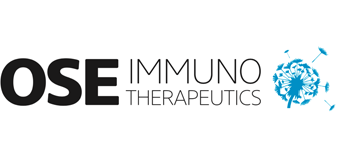- New clinical data confirm the good tolerance of CoVepiT and a very good level of T cell response in healthy volunteers vaccinated.
- Promising preclinical efficacy signals guide development in immunocompromised patients with poor antibody response to present registered anti-COVID vaccines.
- Results on the 6-month long-term memory T response, expected in the first quarter of 2022, will be a key element in further clinical development.
- CoVepiT epitopes* remain independent of mutations identified in current and emerging variants
 OSE Immunotherapeutics announced the positive analysis of the first data of CoVepiT, its prophylactic vaccine candidate against COVID-19, in particular positive interim immunological results on T cell response obtained in 100% of the treated population, with in parallel a resolution of local indurations observed during vaccination.
OSE Immunotherapeutics announced the positive analysis of the first data of CoVepiT, its prophylactic vaccine candidate against COVID-19, in particular positive interim immunological results on T cell response obtained in 100% of the treated population, with in parallel a resolution of local indurations observed during vaccination.
Last July, the company voluntarily suspended the recruitment and administration of CoVepiT in the Phase 1 clinical trial as a precaution due to a limited number of adverse reactions (nodule-like indurations at the injection site) grade 1 and a grade 2 adverse reaction in one participant. Since then, the data have been analyzed regularly with the Independent Safety Monitoring Committee in charge of evaluating the safety of the trial and the Ghent (Belgium) investigation center. The indurations were resolved within a few weeks for most of the participants (without systemic reaction, without fever, nor inflammation, without local ulceration) and the follow-up continues to show a good safety profile. This profile, with frequent indurations, is close to that of vaccines inducing T cell responses (1;2;3) and is regularly linked to this T cell mechanism of action.
The immunological response was measured on the eight healthy volunteers who received CoVepiT, showing the expected efficacy at six weeks after the injection, the primary endpoint of the phase 1 trial, with good immunogenicity of the T cells against the viral epitopes. Interferon-gamma responses measured by Elispot was observed in 100% of participants, from the 22nd day to the 6th week. These immunological results are significantly better than those obtained in convalescent patients and confirm the interest and the mechanism of action of the vaccine on the T cell response.
In addition, new preclinical studies have shown that the intensity and the quality of the immunogenicity of the T cells induced by the CoVepiT vaccine were not altered by concomitant immunosuppressive treatments such as antimetabolites (mycophenolate mofetil, MMF, inhibiting immunosuppressant proliferation of B and T cells) or by a strong depletion of B cells producing antibodies (observed with
rituximab, used in autoimmune diseases and certain cancers). The interest in generating T cells isenhanced especially for immunocompromised patients with weak antibody responses despite repeated administration of current registered vaccines.
Alexis Peyroles, CEO of OSE Immunotherapeutics, comments: “All of the first results generated, on tolerance and immunological results, confirm that the modified epitope platform acts by amplifying the response of T cells and makes it possible to consider longer term protection. For immunocompromised populations, current recommendations relate to the administration of additional doses of vaccines already registered, in an attempt to strengthen the antibody response which currently makes access to these patients and the clinical development of CoVepiT difficult. During the first quarter of 2022, we are awaiting additional 6-month immunogenicity results on the long-term memory T response, and if positive, we will prepare a meeting with the health Agencies to prioritize development in immunocompromised patients. This therapeutic approach of modified epitopes has already enabled us to obtain a T response against tumor antigens in oncology, resulting in a significant benefit in terms of survival for our Tedopi® product in advanced non -small cell lung cancer patients (NSCLC) with secondary resistance to immunotherapy (Atalante-1 ESMO phase 3 results 2021). These new CoVepiT results confirm the value of our epitope platform, in particular for the most fragile populations.”
